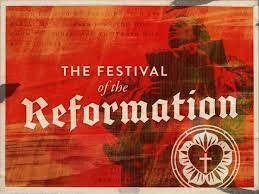Here I Stand
The commemoration of the Reformation is less about a particular date than it is about an era, a time of unprecedented theological discourse and change, after which the landscape of Western Christianity would never be the same. Much can be said about it, and indeed much has, especially during the Reformation’s 500th anniversary in 2017. For Lutherans, the heart of the Reformation is the recovery and faithful proclamation of the Gospel: salvation is by grace alone through faith alone for Christ’s sake alone. In today’s day and age we continue to celebrate the Reformation as a time when God worked through the Reformers for the good of his Church and her confession.
The date of the Reformation festival falls on October 31, the anniversary of that famous day when Martin Luther, a monk and doctor of the Church, pinned his 95 theses to the Castle Church doors in Wittenberg. While this in itself was not some extraordinary event, Luther’s statements against indulgences sparked hot debate among scholars, pastors, and church leadership, causing many to point to this event as the catalyst for the Lutheran Reformation.
As conversation continued, so did the Pope’s displeasure with Luther, who continued speaking out against abuses that had crept into the Church. In 1521 the Pope officially excommunicated Luther who, unwilling to compromise the faithful teaching of the Gospel, had declared, “Here I stand. I can do no other.” This became the first sign of separation within the Church of the West.
Brief History
Not long after the time of the Reformation, Christians recognized how important it was to remember and celebrate this time in the Church’s history year after year. Thus, under the leadership of Wittenberg pastor Johannes Bugenhagen, the Church began recognizing aspects of the Reformation annually. As early as 1528, these celebrations featured the significance of the Bible’s translation into the common language and general thanksgiving for the start of the Reformation. Just over a century later, a more general recognition of the Reformation settled on the date of October 31 under the leadership of the Elector of Saxony.
The Rev. Fred Lindemann acknowledges in his book, The Sermon and the Propers, that the Reformation is a unique and important festival for Lutherans but should not take precedence over its neighboring holiday, All Saints’ Day on November 1st. Between this ancient feast (with its own history, commemorations, and surrounding traditions) as well as newer American Halloween customs, these few days in the Church’s calendar and secular calendar can seem to pull a person in several directions.
Without neglecting the observance of All Saints’ Day, Christians have often observed the Reformation by discussing the ideas and writings that came out of it. Luther wrote his Small and Large Catechisms for this very purpose: that the heads of households would daily catechize the family in God’s Word. From the time of the Reformation, Christians have used the Small Catechism as a tool in the home to start explaining the chief articles of the faith. This is followed by the Large Catechism, which further expounds on those articles.
In addition to these, a family might honor the days surrounding the Festival of the Reformation in their households by choosing to read a sermon every day from Luther or another pastor. In fact, this might be one of the most appropriate ways to utilize Reformation traditions within the home solely because prior to the invention of the printing press just before Luther’s time, the widespread publication of books and sermons was just not possible!


Comments
Post a Comment